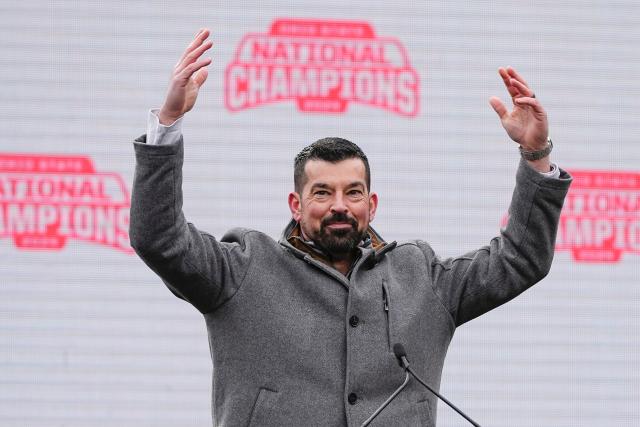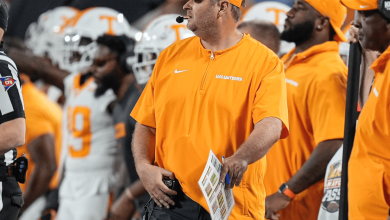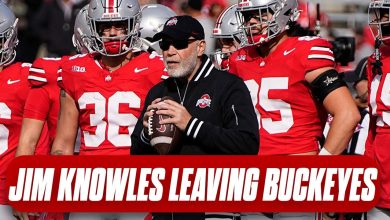Mailbox: Ryan Day of Ohio State football may resemble Woody Hayes more than you may imagine

Ohio State football is one of the most storied programs in college football history, a team that has become synonymous with dominance, championship aspirations, and excellence on the field. The Buckeyes have a rich tradition, built by legendary coaches such as Woody Hayes and Earl Bruce, who established a culture that is still alive today. And now, as Ryan Day enters his fifth season as the head coach of Ohio State, it’s clear that the program is still thriving, even as it evolves under his leadership.
Day’s tenure has included impressive victories, a near-miss in the College Football Playoff National Championship Game, and a competitive edge that has allowed Ohio State to continue being one of the top programs in the nation. However, beneath the surface of Day’s calm, composed demeanor and modern approach to coaching, there is something deeper at play that has some observers drawing comparisons to a coaching icon: Woody Hayes.
Hayes, one of the most influential figures in college football history, was the head coach of Ohio State from 1951 to 1978, amassing five national championships and 13 Big Ten titles during his 28-year reign. Known for his fiery personality, discipline, and his preference for a power-run offense, Hayes built a legacy at Ohio State that many still measure all other coaches against. So when Ryan Day was hired as head coach in 2019, many wondered if he could live up to the monumental legacy left by Hayes and the coaches who followed him.
While Day’s coaching style may appear far removed from that of Hayes in terms of approach, there are certain qualities and similarities between the two that are noteworthy. From leadership style to football philosophy, Day has displayed traits that mirror those of Hayes in surprising ways. In this article, we’ll explore the parallels between Day and Hayes, looking at their coaching philosophies, leadership traits, and what they’ve meant for Ohio State football.
1. Leadership Style: Commanding Respect
One of the most obvious and enduring characteristics of Woody Hayes was his ability to command the respect of his players. Hayes was known for his no-nonsense approach, always demanding the best from his athletes both on and off the field. His passion for the game and his intense focus on discipline helped him build a program that was a true reflection of his character — tough, hard-nosed, and relentlessly committed to winning.
Ryan Day, while much more reserved in comparison to Hayes, similarly commands the respect of his players. Day’s leadership style is marked by a calm, yet authoritative presence. He isn’t one to scream or berate his players, but they know that he expects them to give their all every time they step onto the field. His focus on discipline, preparation, and mental toughness is a direct continuation of the legacy set by Hayes.
Day’s ability to inspire his players and foster a sense of loyalty within the program is something that has drawn comparisons to Hayes. In fact, several players under Day’s leadership have praised his ability to develop personal relationships with them, creating an atmosphere of mutual respect. Day’s calm demeanor in press conferences and in front of the camera hides a fiercely competitive and driven individual who expects perfection from those he leads.
Much like Hayes, Day understands the importance of building a cohesive team environment where everyone — from the stars to the backups — is held to the same high standard. This is a critical trait for any coach, and it’s one that Day shares with his legendary predecessor. While Day may not be as outwardly fiery as Hayes, his players understand his expectations, and they rally around him for that very reason.
2. The Power Running Game: A Fundamental Philosophy
Woody Hayes is often synonymous with the power run game. Known for his “three yards and a cloud of dust” philosophy, Hayes preferred a smash-mouth style of football that relied heavily on physicality and controlling the line of scrimmage. Under Hayes, Ohio State built an identity around the running back, with legendary players such as Archie Griffin and Keith Byars becoming household names. Hayes’ offensive system, which heavily featured the running game, became a staple of the Buckeyes’ identity.
At first glance, Ryan Day’s offensive philosophy may seem like a departure from Hayes’ approach. Day’s offense is known for its pass-heavy schemes, centered around star quarterbacks like Justin Fields and C.J. Stroud, with an emphasis on spreading the field and attacking through the air. Under Day’s leadership, Ohio State has evolved into one of the most potent offenses in college football, often ranked among the top in passing yards and scoring offense. However, what many fail to realize is that at the heart of Day’s system, there is still a commitment to running the ball effectively.
In Day’s early years, Ohio State’s running game remained a central focus. Even as Day embraced the modern, up-tempo style of football, the Buckeyes still relied on a strong running back committee to set the tone in games. Day has recognized the importance of balance in his offense, often making sure his teams maintain a strong presence in the running game. This allows the Buckeyes to remain unpredictable and effective, just as Hayes’ teams were in their time.
While Day has adapted to modern trends and utilizes a dynamic passing attack, his ability to incorporate the running game into his offense is a nod to Hayes’ influence. Whether it’s the bruising style of running back Miyan Williams or the explosive speed of TreVeyon Henderson, Day understands that a successful offense requires more than just a strong passing game — it requires a balanced attack that forces defenses to respect both the pass and the run. This dual-threat approach mirrors the philosophy Hayes instilled during his time at Ohio State.
3. Relentless Pursuit of Excellence: Cultivating Winning Mentality
One of Woody Hayes’ most enduring qualities was his unyielding pursuit of excellence. He demanded that his players give everything they had on every play, and his emphasis on hard work and discipline was evident in every aspect of the program. Hayes didn’t just want to win games; he wanted to build a culture where winning was expected, and anything less was unacceptable.
Ryan Day has inherited this mentality from Hayes and instilled it into his own players. While Day may be known for his focus on player development and his emphasis on building a culture of growth, he also has a relentless drive to succeed. His insistence on excellence has translated into a program that consistently competes for Big Ten championships and College Football Playoff berths. In fact, under Day’s leadership, Ohio State has continued to maintain a winning tradition, with few years in which the team is not a serious contender for a national title.
Day’s approach to recruiting is also reminiscent of Hayes. Hayes was known for his ability to bring in top-tier talent, often securing some of the best players in the nation to help sustain his program’s success. Day has followed suit, consistently securing top-ranked recruiting classes and ensuring that Ohio State remains at the forefront of college football talent. In addition, Day’s focus on player development, ensuring that athletes reach their full potential, is another reflection of Hayes’ commitment to excellence.
Both coaches have understood that a winning culture is not built on talent alone — it’s built on hard work, commitment, and a refusal to accept mediocrity. Day’s pursuit of excellence, much like Hayes before him, has been a driving force behind Ohio State’s sustained success.
4. Legacy and Impact: Building Ohio State for the Future
Perhaps the most significant similarity between Ryan Day and Woody Hayes is their shared understanding of what Ohio State football means to the university, the fan base, and the state of Ohio. Hayes’ impact on the program is immeasurable, and his legacy continues to live on in every corner of Ohio State football. For Day, this is something he takes seriously. He understands that being the head coach of Ohio State is not just a job — it’s a responsibility to uphold the tradition and legacy of the program.
Day has embraced this responsibility, ensuring that Ohio State remains a national power while also respecting the rich history of the program. His success thus far in continuing the program’s dominance — including regular wins over rivals like Michigan and continued appearances in the College Football Playoff — has made him a worthy successor to Hayes, even if their coaching styles differ in many ways.









